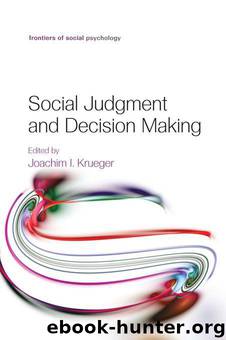Social Judgment and Decision Making (Frontiers of Social Psychology) by Unknown

Author:Unknown
Language: eng
Format: mobi
ISBN: 9781136988578
Publisher: Taylor and Francis
Published: 2012-05-03T14:00:00+00:00
9
Social Judgments From Adaptive Samples
JERKER DENRELL AND GAËL LE MENS
Why is it that people sometimes believe “what is not so?”
Thomas Gilovich, 1991
Avast amount of research has documented the systematic judgment errors that people make. They use inaccurate stereotypes about those belonging to other groups, they develop superstitious beliefs, they are overconfident about their predictive abilities, and so on. Much of the existing social psychological literature suggests that such biases emerge because people process information inaccurately; they use flawed hypotheses tests and motivated reasoning, and rely on biased heuristics (for example, Fiske & Taylor, 2007; Tversky & Kahneman, 1974).
Recently, however, a number of scholars have challenged the perspective that fallible judgment is driven by flawed processing of information. Noting that the environment often produces unrepresentative samples of information, they have demonstrated that even if individuals process available information correctly, their judgments will be subject to systematic error patterns akin to those previously explained by invoking information-processing deficiencies (see Fiedler & Juslin, 2006, for a review). This sampling approach has, for example, produced alternative explanations for in-group bias, illusory correlation (Fiedler, 2000), and overconfidence (Juslin, Winman, & Hansson, 2007).
In this chapter, we argue that an important source of such information bias is adaptive sampling, defined here as the tendency of decision makers to select again, and thus continue to sample, activities that led to positive experiences but to avoid activities that led to poor experiences. Such a tendency is basic to most learning mechanisms.1 It is adaptive because it ensures that decision makers avoid activities with consistently poor outcomes. Nevertheless, it generates a sample bias: The likelihood that an individual will take another sample and get more information about the outcome of an activity depends on past experiences with that alternative. In particular, the decision maker will stop learning about alternatives she (possibly mistakenly) evaluates negatively.
We argue that adaptive sampling can cast new light on several well-known judgment biases in social psychology, such as in-group bias in impression formation (Denrell, 2005), risk aversion (Denrell, 2007; Denrell & March, 2001), more positive assessments of popular alternatives (Denrell & Le Mens, 2011b; Le Mens & Denrell, 2011), illusory correlations (Denrell & Le Mens, 2011a), and social influence (Denrell & Le Mens, 2007).
Our perspective emphasizes an understudied interaction between two important aspects of belief formation. The first aspect pertains to the goal of the decision maker. People sometimes select alternatives or interact with other individuals just to learn about those. But, they often care about the immediate outcomes of their choices, and not just about the informational content of their experiences: their goal is often to ultimately have positive, enjoyable experiences. This desire for positive experiences is important because it provides the rationale for the adaptive selection of alternatives, based on past experiences used as predictors for future experiences. The second aspect is the role of the environment as a factor that constrains and enables access to information and thus indirectly influences decision making and judgment. Constrained access to information, combined with adaptive sampling, can explain what seem to be “irrational” judgments without assuming flawed information processing.
Download
This site does not store any files on its server. We only index and link to content provided by other sites. Please contact the content providers to delete copyright contents if any and email us, we'll remove relevant links or contents immediately.
The Brazilian Economy since the Great Financial Crisis of 20072008 by Philip Arestis Carolina Troncoso Baltar & Daniela Magalhães Prates(105947)
International Integration of the Brazilian Economy by Elias C. Grivoyannis(75737)
The Art of Coaching by Elena Aguilar(52214)
Flexible Working by Dale Gemma;(23213)
How to Stop Living Paycheck to Paycheck by Avery Breyer(19572)
The Acquirer's Multiple: How the Billionaire Contrarians of Deep Value Beat the Market by Tobias Carlisle(12115)
Thinking, Fast and Slow by Kahneman Daniel(11807)
The Radium Girls by Kate Moore(11639)
The Art of Thinking Clearly by Rolf Dobelli(9930)
Hit Refresh by Satya Nadella(8870)
The Compound Effect by Darren Hardy(8527)
Atomic Habits: Tiny Changes, Remarkable Results by James Clear(8055)
Tools of Titans by Timothy Ferriss(7828)
Turbulence by E. J. Noyes(7717)
Change Your Questions, Change Your Life by Marilee Adams(7388)
A Court of Wings and Ruin by Sarah J. Maas(7286)
Nudge - Improving Decisions about Health, Wealth, and Happiness by Thaler Sunstein(7261)
How to Be a Bawse: A Guide to Conquering Life by Lilly Singh(7165)
Win Bigly by Scott Adams(6836)
